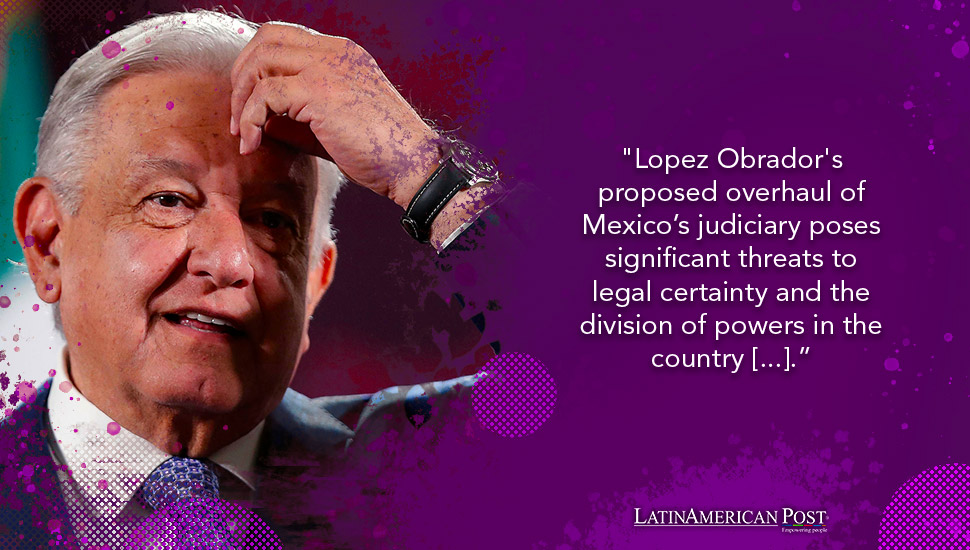Judicial Reform in Mexico: A Threat to Legal Certainty and the Division of Powers

President Andres Manuel Lopez Obrador’s proposed overhaul of Mexico’s judiciary poses significant threats to legal certainty and the division of powers in the country, sparking an indefinite nationwide strike by judicial workers.
Mexico is facing a pivotal moment as its judicial system hangs in the balance, threatened by a proposed reform that could fundamentally alter its legal landscape. The reform, a top priority for outgoing President Andres Manuel Lopez Obrador, aims to overhaul the judiciary by introducing the popular election of judges, among other changes. This move has been met with strong opposition from judicial workers and legal experts who argue that the reform is being rushed through without proper consideration of its long-term consequences.
The proposed changes ignited a nationwide strike earlier this week by unions representing many of Mexico’s 55,000 judicial workers. The unions have criticized the reform as a danger to the “only counterweight” to the ruling Morena party’s dominance in both the presidency and Congress. The judiciary has long served as a crucial check on executive power, and the proposed overhaul threatens to weaken this balance, potentially paving the way for greater executive control over the judiciary.
Earlier this week, videos circulating on social media showed workers locking chains around the gates of courts and judicial complexes across the country, symbolizing their deep concerns over the potential erosion of judicial independence. The unions’ statement highlights the risks of rushing through such a significant reform without thorough debate and analysis, warning that it could undermine the very foundation of Mexico’s legal system.
The Undermining of Merit-Based Judicial Careers
One of the most alarming aspects of the proposed judicial reform is its potential to dismantle the merit-based career paths that have long been the cornerstone of Mexico’s judiciary. The unions representing judicial workers argue that the move towards the popular election of judges could lead to the erosion of a system that traditionally values experience, knowledge, and impartiality.
The current merit-based system ensures that judges are selected based on their qualifications and experience rather than their popularity or political affiliations. This system has been instrumental in maintaining professionalism and independence within the judiciary, allowing judges to make decisions based on the law rather than political pressures.
The proposed reform, however, threatens to replace this meritocratic system with one driven by political considerations. By subjecting judges to the whims of the electorate, the reform risks turning the judiciary into a political battleground, where judges are chosen not for their legal expertise but for their ability to garner votes. This shift could have devastating consequences for the integrity of Mexico’s legal system, leading to a judiciary that is more susceptible to political influence and less capable of serving as an impartial arbiter of justice.
Politicization of the Judiciary
The proposed judicial reform raises severe concerns about the politicization of the judiciary in Mexico. By introducing the popular election of judges, the reform opens the door to a judiciary more closely aligned with political interests than with the principles of justice and the rule of law. This is a dangerous precedent that could undermine the independence of the judiciary and erode public confidence in the legal system.
President Lopez Obrador’s ongoing clashes with Mexico’s Supreme Court judges have only heightened these concerns. The president has repeatedly criticized the judiciary, accusing Supreme Court judges of being corrupt and serving the interests of powerful elites rather than the people. Combined with the proposed reform, this rhetoric suggests a concerted effort to bring the judiciary under greater executive control.
The gradual implementation of the reform, with the election of all Supreme Court judges next year and half of all magistrates by 2027, raises the specter of an increasingly politicized judiciary over time. As judges are forced to campaign for their positions, they may feel compelled to align themselves with political parties or special interest groups, compromising their ability to act independently and impartially. This shift could have far-reaching implications for the rule of law in Mexico, as judicial decisions become more influenced by political considerations than legal principles.
Legal Uncertainty
The proposed judicial reform has already spooked investors, who fear the changes could lead to more significant legal uncertainty in Mexico. The prospect of a politicized judiciary, where electoral considerations influence legal rulings, is a cause for concern for businesses and investors who rely on a stable and predictable legal environment.
Legal certainty is a fundamental component of a functioning economy. It gives businesses the confidence that contracts will be enforced, property rights will be protected, and disputes will be resolved fairly and impartially. The proposed judicial reform threatens to undermine this certainty by introducing an element of unpredictability into the legal system.
If judges are elected based on their popularity rather than their legal expertise, there is a risk that judicial decisions could become more erratic and less consistent. This could lead to a situation where businesses cannot predict how legal disputes will be resolved, making planning and investing more difficult.
The potential for increased legal uncertainty could also have broader implications for Mexico’s economic stability. As businesses become more wary of operating in an environment where the rule of law is undermined, they may choose to invest elsewhere, leading to a decline in economic growth and job creation. This could exacerbate existing economic challenges in Mexico and make it more difficult for the country to attract foreign investment.
Also read: The Forgotten Victims of Mexico’s “Death Flights”
The proposed judicial reform in Mexico seriously threatens legal certainty and the division of powers essential for a functioning democracy. The reform risks politicizing the legal system and eroding public confidence in the rule of law by undermining the judiciary’s independence and introducing the popular election of judges. As Mexico moves forward with this controversial reform, lawmakers must consider the long-term consequences and ensure that the judiciary remains an independent and impartial institution that serves the interests of justice rather than political agendas.





